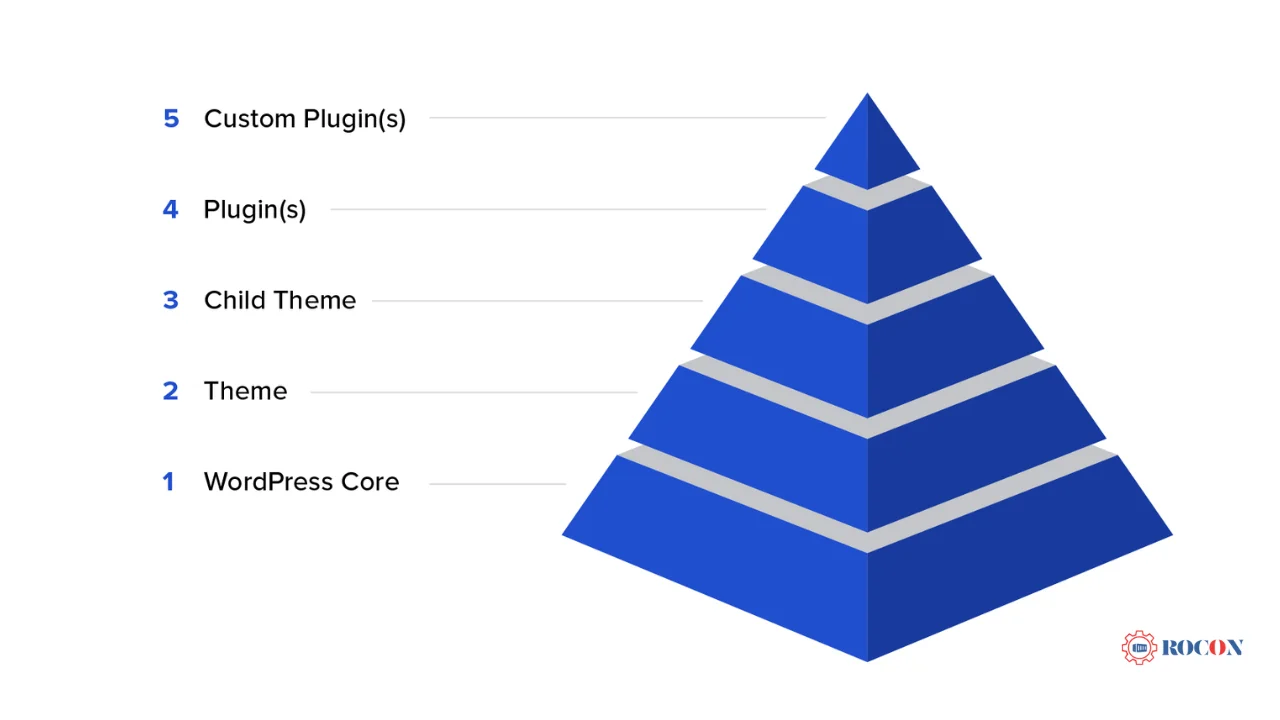What’s the Most Critical Component on the WordPress Site? WordPress powers 40% of the web and is super flexible for all kinds of sites. But what makes a WordPress site work? Is it the theme, plugins, or something more? The answer isn’t simple—it depends on how your site is designed to serve its purpose.
The key parts of a WordPress site work together: WordPress Core provides functionality, and content engages and informs visitors. A theme looks nice and responsive and plugins improve performance. Security protects your site from threats, hosting keeps it running and SEO brings in traffic.
None of that guarantees success; it’s all about balance. By focusing on great content, a smooth user experience, and solid foundations you can have a powerful and long-lasting WordPress site.
Ready to get into the nitty-gritty? Let’s dive into what’s the most critical component on the WordPress site and how to fine-tune each for performance.
Secure the Core of Your WordPress Site Today
Your hosting is the backbone of your WordPress site. Choose Rocon for unmatched speed, security, and scalability. Don’t wait—upgrade your hosting now!
Explore More
Database: The Heart of WordPress
Your WordPress site’s database stores and organizes everything you need to run your site. From blog posts and page content to plugin configurations and user information, the database is where it all lives. Without it, your site would lose its structure and functionality, leaving you with just an empty shell.
Why It’s Crucial
The database is where all your WordPress site data is stored—posts, pages, user information, settings, and even plugin configurations. It’s the backbone of your site, ensuring smooth data retrieval and storage. Without a well-maintained database, your site could suffer from slow load times or even data loss.
Best Practices
Regularly back up your database to prevent data loss during updates or breaches. Use optimization plugins like WP-Optimize to remove unnecessary data and improve performance. Choose a hosting provider with robust database support, and limit excessive queries by using efficient plugins and themes.
WordPress Core: The Base

Think of the WordPress Core as your site’s heart. It’s everything – content management, theme integration, and plugin support. Without the Core, your site wouldn’t exist.
Why It’s Crucial
The WordPress Core contains the basic files and scripts that make up your site. It renders content, handles user roles, and provides compatibility for themes and plugins. Without the Core, your site wouldn’t work. Regular updates patch security holes, optimize performance, and add new features keeping your site stable and secure.
Best Practices
Always update to the latest WordPress version to get the latest security patches and enhancements. Never edit Core files; use child themes or plugins instead. Good hosting and debugging with tools.
Content is the Lifeblood of Your Site
Content is king. Blog posts, product descriptions, or video, content gets visitors to your site.
Why It’s Crucial
Content drives engagement, educates visitors, and brings them back. It’s your brand’s voice and the main value proposition for your audience. High quality, SEO content ranks better and keeps visitors on your site longer.
Best Practices
Relevant, researched, and visual content. Use a content calendar to schedule regular posts and include images and videos to make it more readable. Optimize for SEO with headings, meta descriptions, and keywords.
Themes: The Visual Foundation
The theme is your site’s outfit – it dictates how your WordPress site looks and feels. A good theme balances looks and function so your site works well and looks great on all devices.
Why It’s Crucial
Your theme is your site’s look and user experience. A bad theme will scare off visitors, a lightweight and responsive theme means fast load times and smooth navigation on all devices.
Best Practices
Choose themes that are lightweight, mobile-friendly, and SEO optimized. Use a child theme to customize and preserve changes during updates. Check for updates to fix bugs and ensure compatibility with the latest WordPress Core.
Plugins: The Swiss Army Knife
Plugins are what make WordPress magic happen. Need a contact form? There’s a plugin for that. Want to boost SEO? Plugin. Secure your site? You guessed it—plugin!
Why It’s Crucial
Plugins extend your site’s functionality, from contact forms to security and SEO. The right plugins let you tailor your WordPress site to your needs, so they’re essential.
Best Practices
Only install reputable plugins that are updated regularly. Don’t overload your site with unnecessary plugins to keep it fast and stable. Use Plugin Organizer to manage load orders for best performance.
Security: Protect Your Kingdom
A secure WordPress site is a happy site. Without proper security, your site can get malware or hacked.
Why It’s Crucial
A secure WordPress site builds trust, protects user data, and prevents costly breaches. Compromised security can lead to data loss, revenue loss, and reputation loss.
Best Practices
Keep WordPress Core, themes, and plugins updated. Use strong passwords, two-factor authentication, and security plugins like Wordfence. Back up your site regularly and use SSL to protect user data.
Elevate Your WordPress Experience
Reliable hosting is key. Trust Rocon for fast, secure, and scalable solutions tailored for WordPress. Try now!
Explore More
Hosting: The Unsung Hero
The hosting provider is the foundation of your site’s performance. Fast and reliable hosting means your site is always up and running.
Why It’s Crucial
Your hosting provider is the foundation of your entire WordPress site. It determines how fast your site loads, how secure it is, and how well it can handle traffic spikes. A bad host can cause slow performance, downtime, or even security vulnerabilities. A good host means your site runs smoothly, has great uptime, and has support when things go wrong.
Best Practices
Choose a host that specializes in WordPress, they know the platform inside out. Go for a plan with scalable resources so your site can grow as traffic increases. Look for features like SSD storage, regular backups, and SSL certificates to improve security and speed. Always check your site’s performance using tools like Google PageSpeed Insights to see where you can improve.
Auto-Healing Infrastructure
WordPress relies on many moving parts—plugins, themes, and external APIs. So what really matters isn’t just having components in place, but what happens when something breaks. That’s why Rocon introduces Auto-Healing Infrastructure, designed to keep your site live, responsive, and secure—even in the face of unexpected failures.
Whether your site is based in the USA, India, or elsewhere, this automated resilience means you don’t have to watch the dashboard and hope things stay online.
Why Auto-Healing Is a Game-Changer:
- Instant recovery—containers restart automatically without human intervention
- Failure isolation—only the impacted part of your setup resets, while the rest of the site remains online
- Global reliability—maintains uptime during crashes, DDoS, or plugin conflicts
- Smart alerting—auto notifications keep you informed while recovery happens behind the scenes
- Peace of mind for site owners and agencies—you focus on content and conversions, not firefighting
Performance Optimization: Speed Matters.
If your site takes more than 3 seconds to load, visitors will leave faster than you can say WordPress. Performance optimization is key to user retention and search engine rankings.
Why It’s Crucial
Site performance is related to user experience and SEO rankings. Slow sites annoy users and increase bounce rates. Google also considers site speed as a ranking factor, so slow sites will show lower in search results. Better performance means better experience, more engagement, and better SEO.
Best Practices.
Use caching plugins like W3 Total Cache to speed up your site. Compress images using tools like Smush to reduce load times. Minimise HTTP requests by combining CSS and JavaScript files. Use a content delivery network (CDN) to distribute content across multiple locations. Test your site regularly and adjust to optimize.
Conclusion: A Symphony of Components
So what’s the most critical component on the WordPress site? You can’t pick just one. It’s all of these working together:
Content brings in and keeps users.
Themes and plugins add functionality and style.
Security, hosting, and performance keep it running smoothly.
SEO brings in traffic and the WordPress Core ties it all together.
By knowing these and optimizing them you’ll have a WordPress site that’s functional and fun to use. Ready to get started?
What’s the Most Critical Component on the WordPress Site FAQs
1. What is the most significant aspect of a WordPress website?
It depends on the purpose of your website, but the WordPress Core is crucial because it serves as the framework for all other components to function.
2. How do I make my website faster?
Caching plugins, compressing images, reducing HTTP requests, use a CDN.
3. What are the best practices for choosing a WordPress theme?
Lightweight, responsive, SEO friendly, updated often, a child theme for modification.
4. How can I make sure my WordPress site is secure?
Keep WordPress core, themes, and plugins up to date, use strong passwords, enable two-factor authentication, and install a security plugin such as Wordfence.
5. Do I require a lot of plugins to make my WordPress site functional?
No, only install necessary and reputable plugins to avoid overloading your site, which can affect performance and stability.
6. Why is hosting so important for my WordPress site?
Hosting impacts your site’s speed, uptime, and security. Choose a WordPress-specialized host for optimized performance and support.

Leave a Reply